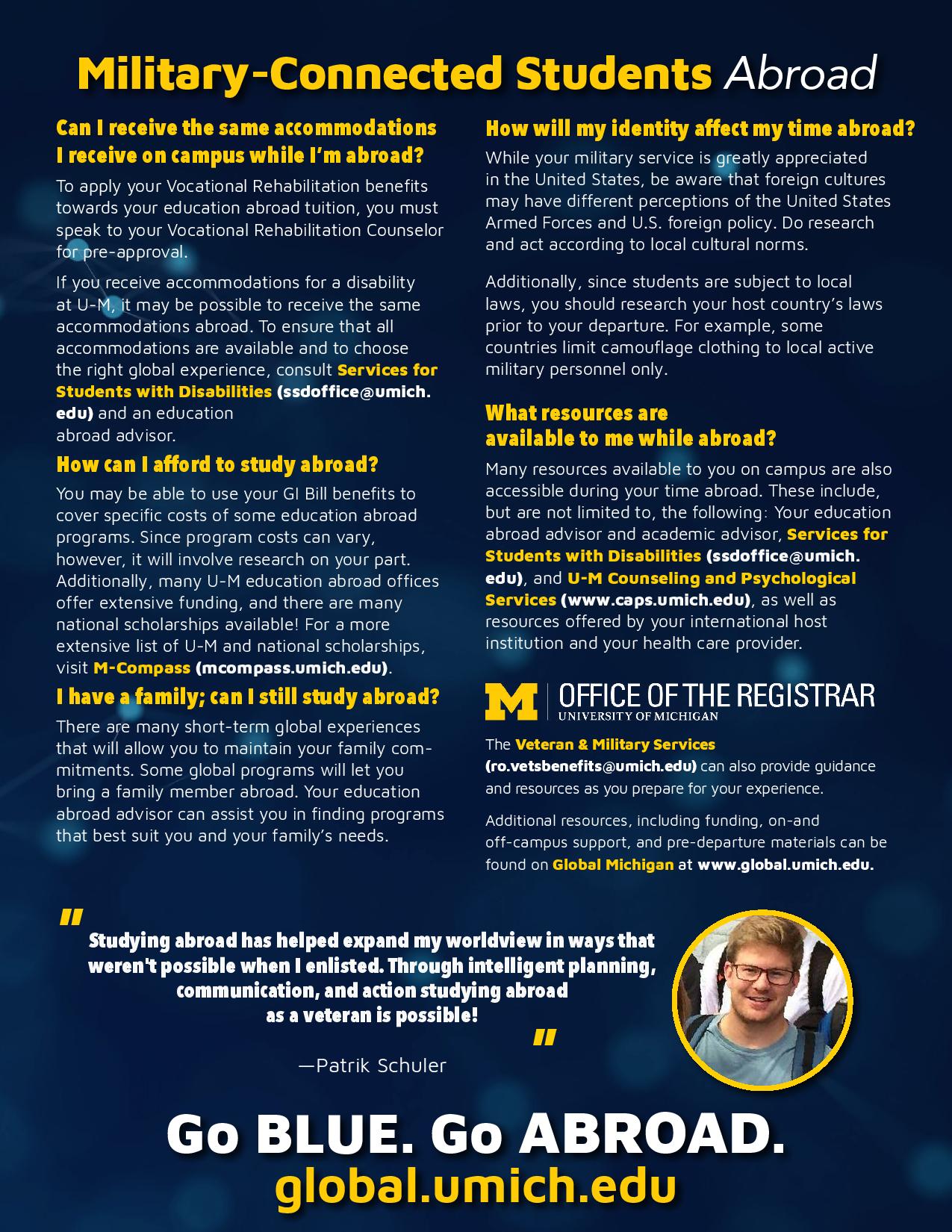Military-Connected Students Abroad
Introduction
As a military, veteran, ROTC, or military affiliated student you may view the concept of interning, studying, or performing research abroad differently than your peers. By participating in these experiences through the lens of education you are able to gain new perspectives about the world and yourself. These types of experiences can often enhance and compliment any experiences you may have had in the military. Furthermore, you may be able to use your GI benefits for for-credit international education programs as long as they meet certain criteria.
Questions to Consider/Action Items
General Concerns
When considering going abroad, it is best to seek advice from several people on campus. First, make appointments to speak with your advisors, specifically in international programs, academic advising and School Certifying Officials in the Office of the Registrar.
Some questions you may want to consider are:
- How is the military viewed in my host country?
- How will that affect my experience as I learn more about the people and the culture of the host country?
- What unique perspectives and previous global experience can I contribute to my study abroad experiences?
- What new skills do I want to gain while abroad?
- What military assistance and benefits can I use towards my study abroad program?
- What military/work, family and/or home, responsibilities do I need to take into consideration when choosing a program?
- How might other parts of my identity in addition to my military affiliation affect my experience abroad?
- What kind of international experience do I want to have?
- How long do I want to go abroad?
- How can I find courses that will work for my academic plan?
ACTION ITEMS:
- Do your research. Speaking with advisors (IPE, Academic, and School Certifying Officials) and other students who have gone abroad in the past is a really great way to start, but take the time to look into all your options to ensure that you make the best decision for you.
- Find scholarships. There are lots of scholarships that exist for education abroad. Your advisor can help you navigate these. It is important to know that many scholarship deadlines tend to be early so start this process as soon as possible.
Resources
- Your IPE Advisor can direct you to resources regarding your intended plans for your international experience
Scholarships & Financial Support
- As a military-connected student, you may be eligible to use your GI Bill benefits towards for-credit education abroad programs if the associated courses count towards the completion of your degree and the VA has approved the foreign school for GI Bill funding. VA benefits only cover educational costs (e.g. tuition) and do not cover personal expenses such as lodging, meals, flight costs, or any third-party charges. Additionally, The VA could provide a monthly housing allowance under the Post 9/11 GI Bill if you are enrolled more than ½ time. The MHA rate may vary depending on the program.
- CoE’s Go Global Fund: This fund is run via IPE and intended for first time travelers and students with demonstrated financial need
- Benjamin A. Gilman-McCain International Scholarship: The Gilman-McCain Scholarship is a congressionally funded initiative of the Bureau of Educational and Cultural Affairs at the U.S. Department of State and named after the late senator John S. McCain from Arizona.The Gilman-McCain Scholarship provides awards of $5,000 for child dependents of active duty service members to study or intern abroad on credit-bearing programs.


